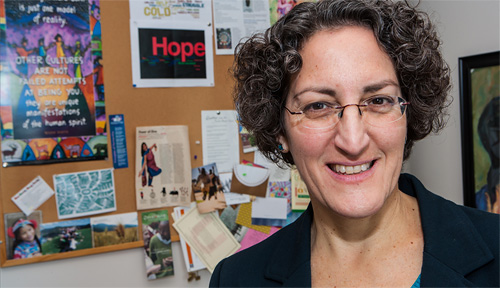Ruti Margalit, M.D., is a champion.
Not a champion in the normal sense — rather, she champions students into heroes.
Dr. Margalit, associate professor in UNMC’s College of Public Health, founded and directs the Service Learning Academy (SLA) — a program to help health professions students find the true meaning of service through authentic community engagement.
“It is intended for students to rediscover their commitment to service and grow from these experiences to engage and address community identified needs.”
Students use classroom skills to educate, screen and treat members of several underserved communities. They work with county jail inmates who encounter sexually transmitted diseases, provide health services and education to newly arrived refugees from war zones, aid the homeless, help victims of domestic violence and work to decrease the bone marrow donor deficit among minority populations.
Every year, more than 600 students from the Colleges of Medicine, Nursing, Pharmacy and Public Health, and the School of Allied Health Professions at UNMC, along with students from Creighton University’s medical and dental schools, make a meaningful difference in the lives of thousands in the Omaha area.
UNMC Chancellor Harold M. Maurer, M.D., calls it ‘high touch.’
“There’s tremendous technology at UNMC, but what’s important in health care is the high touch and communication between you and your patient, community and population,” he told students at a recent SLA recruitment event.
He knows because he’s been there and done that.
As a medical student he was assigned to care for a Puerto Rican family in Red Hook, an impoverished area of Brooklyn, N.Y. The family, who had immigrated a year earlier, barely spoke English and had many health problems. They didn’t know what services were available to them.
He spent the semester working with the family, coordinating care with community organizations. “It was an enormous experience.”
Even though he’d met his requirement, Dr. Maurer followed the family through the end of medical school. “It was a privilege and an honor to help someone in that situation.”
The goal at UNMC is to develop an undifferentiated student — “who has the skills to do whatever they want to do,” Dr. Maurer said. “This program provides an opportunity to do that.”
After Dr. Margalit joined the department of preventive and societal medicine in 2003 (now Health Promotion in the College of Public Health), she noticed two opportunities to enhance the curriculum — interprofessional education and community engagement.
With work experience from the Johns Hopkins Bloomberg School of Public Health in Baltimore, Md., and with underserved communities in the United States and abroad, she started to make service learning part of the landscape.
“Students start their first year with high moral values, altruism and a sincere enthusiasm to serve, but stress, competition and time devoted to study can take a toll and by the second year, some are exhausted and cynical. We call it ‘the hidden curriculum.’
“We strive to create excellent professionals, and at the same time we need to affirm with students that who they are is as important as what they know; that the qualities of compassion, communication, leadership, respect and dignity are at the core of all health care professionals. Service learning provides that environment,” Dr. Margalit said.
By 2004, the interprofessional initiative started and students and faculty slowly began to realize the value of the program.
In 2009, the College of Public Health welcomed a new dean, Ayman El-Mohandes, M.B.B.Ch., M.D., M.P.H., who endorsed the vision of a service learning academy. Dr. Margalit’s grass root efforts were formalized.
Now, student leaders devote evenings and weekends to engage with the community, explore cultural competency, publish papers and write grants. Through it all they have developed great respect for each other’s health care fields. The SLA raised more than $200,000 to support activities, bolstered by grants from Dr. El-Mohandes, academic affairs, UNMC’s Alumni Associations and a major grant from the Weitz Family Foundation.
“Service learning allows students to participate in a reciprocal manner with community members — serving and learning. Community members and leaders are co-teachers, and a true community- academia partnership is built,” Dr. Margalit said. “Students are reminded that they are part of a bigger world and that there’s a fine line between them and those being helped.”
Yes, heroes must have humility.
What students say
“It gives me courage to pursue passions that may seem unconventional because I now
know, somewhere, that others are also fighting a similar fight.”
– Tessa Commers, third-year medical student
“I felt honored to be included as a part of such an ambitious, motivated and talented
group and left with incredible insight and inspiration to move EMPOWER to the next level.”
– Christine Hauschel, MPH student
